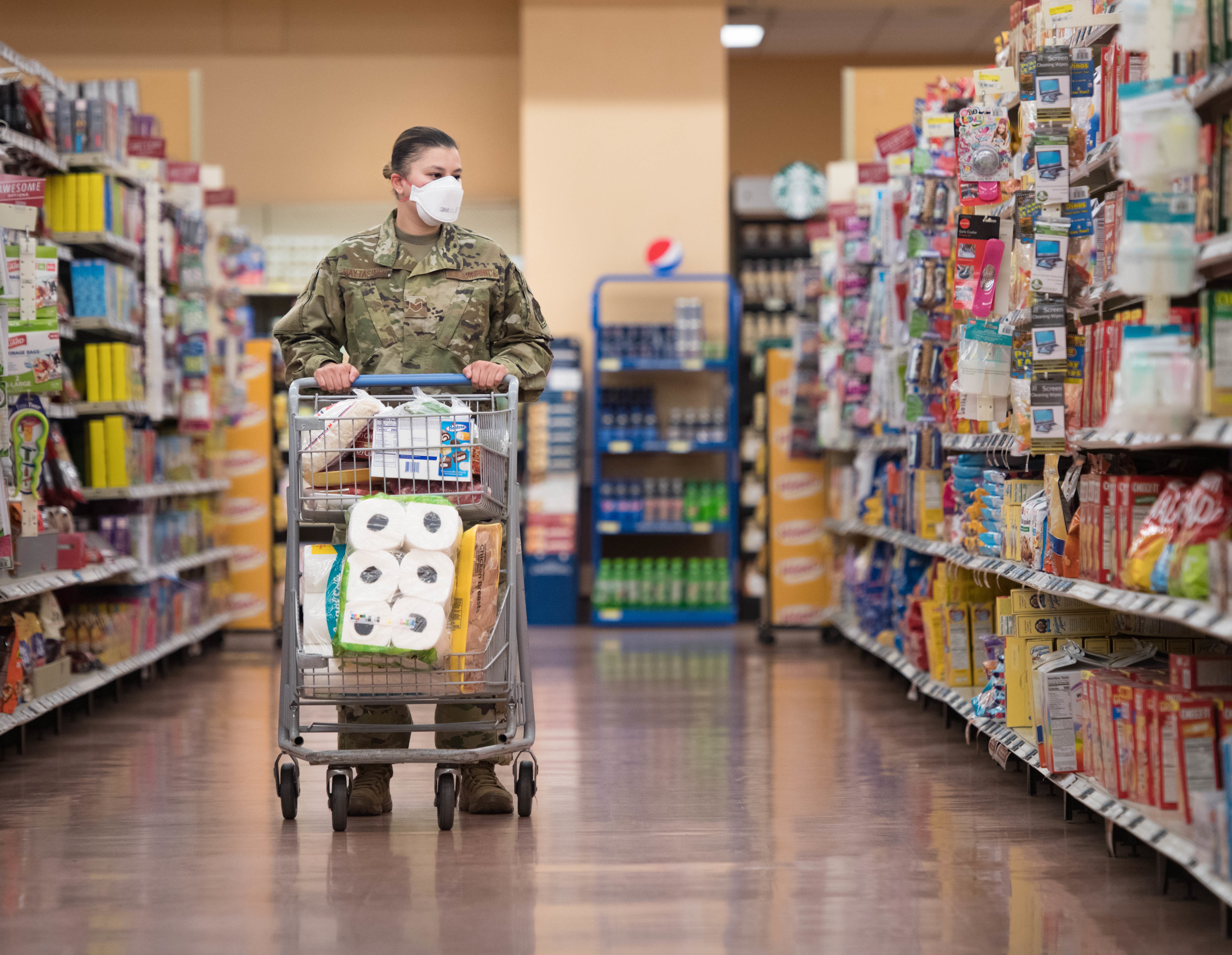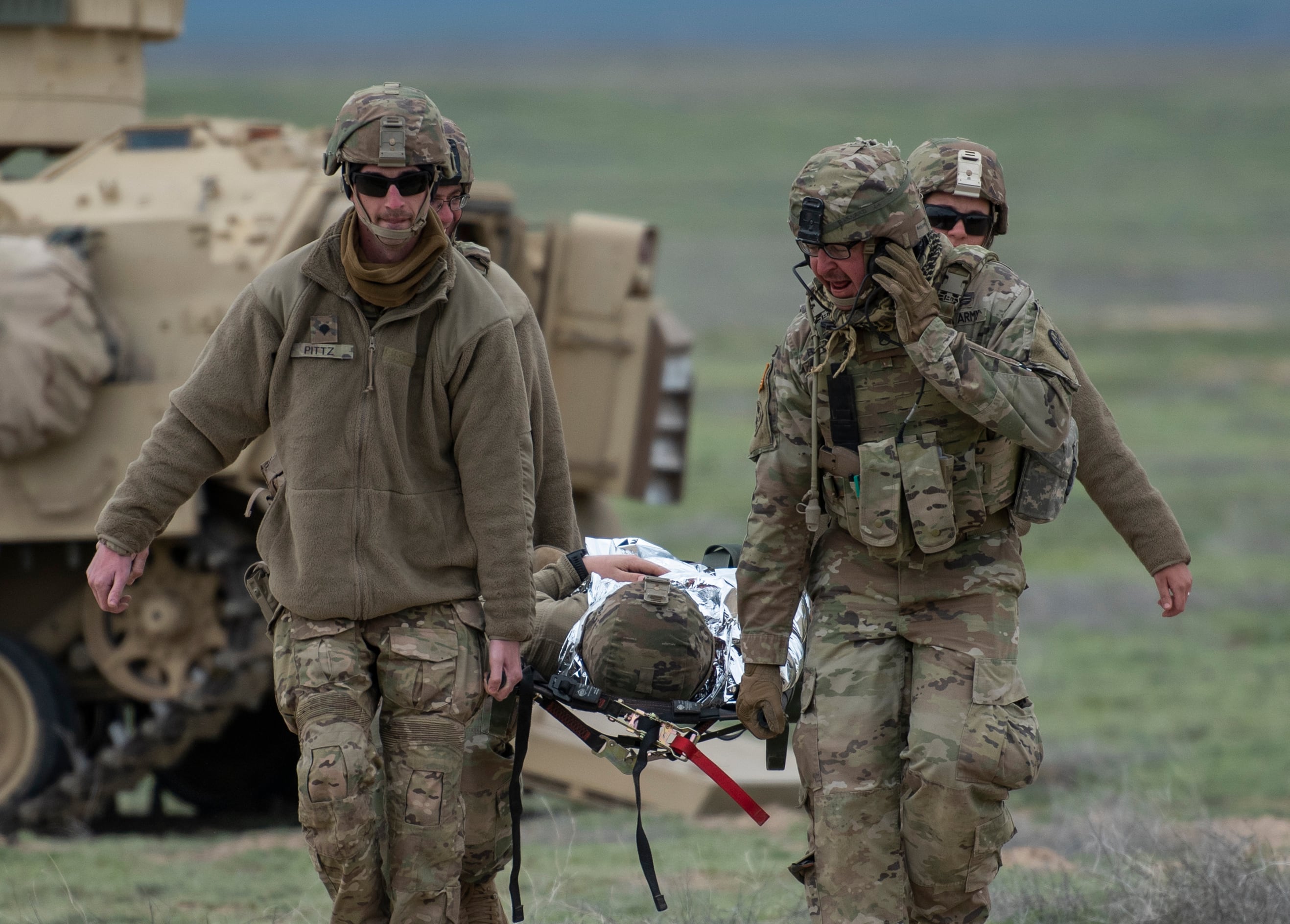Commissary customers have been taking advantage of their benefit in record numbers during the pandemic, officials said.
The stores are one of the few military quality of life benefits that have stayed open on all military bases during the pandemic, and like grocery stores in the civilian community, they’ve seen a surge in demand.
On March 13, the commissary system posted the highest one-day dollar amount of sales —$34.5 million — in the history of the Defense Commissary Agency, said retired Navy Rear Adm. Robert Bianchi, DoD special assistant for commissary operations, during a virtual roundtable of the American Logistics Association. On March 14, commissaries posted the seventh highest sales number in DeCA’s history; March 12 was the 11th highest. Overall commissary sales in March were up by 30 percent compared with March 2019.
Sales in April were up by 8 percent compared with April 2019, but transactions were down by 21 percent. That mirrors the trend in civilian grocery stores where customers are shopping less often, but buying more when they do shop, Bianchi said.
“The pandemic is not what we all would ever wish for, but if we can find a silver lining, it has given resurgence to the importance of these quality-of-life benefits,” Bianchi said.
Defense officials’ support of commissaries has been key, especially in designating commissaries as “mission critical,” Bianchi said. That designation meant that the commissaries would stay open regardless of an installation’s health protection condition, "because senior leadership realized how important it was to feed our families,” Bianchi said. All 236 commissary stores have remained open during the pandemic, he said, except for a several-day closure at Mitchel Field, New York, due to an outbreak.
That said, Bianchi reminds customers that there have been restrictions placed on shopping in some locations that are put in place by base commanders, not by commissary officials. “We’re not restricting the benefit at all. I want to make that point clear,” Bianchi said. Installation commanding officers have responsibility for the safety and security of their bases, so there are some locations where they’re allowing non-essential personnel on base only on certain days for reasons related to the coronavirus. “I hope people understand that base commanders have to weigh all these risks,” he said.
As more was learned about health protection and sanitation during the pandemic, commissary officials took steps like putting plexiglass shields at checkouts; requiring face coverings for employees and all customers; and increasing their sanitizing. “This is something we are certainly proud to remind our patrons: that the commissaries and exchanges are a very safe place to shop,” Bianchi said. There are indications some people have come back “who may not have shopped with us for a while because they did understand and realize that is is a safe haven perhaps in an otherwise stormy environment,” he said.
He praised the efforts of commissary employees and industry. “If there was ever a time that the military resale system in general rose to the occasion, it was really during this pandemic event.”
Some of the high points:
• Click2Go was a big hit and will be rolled out to four to six more commissaries this year, barring any pandemic issues and restrictions that hamper the efforts. The commissary’s online ordering/curbside pickup program, available at five commissaries, saw a “huge increase” in customers’ use of the program, Bianchi said. For example, at Fort Belvoir, the usage jumped from about 150 orders a week in early March, to about 1,000 orders a week in April, he said. “People definitely like the idea of being able to shop online, and pick up their groceries,” he said. Click2Go started rolling out in 2019, and is also available at Virginia’s Fort Eustis, Oceana Naval Air Station, and Quantico Marine Corps Base; and McGuire commissary at Joint Base McGuire-Dix-Lakehurst in New Jersey.
• Stores have gotten creative in helping customers get groceries. The “agent shopping program” was developed in Europe because a lot of installations’ local communities were in lockdown and customers couldn’t get to stores, Bianchi said. Local installation and commissary officials put together a cadre of volunteers who would take the customer’s order, pick the items off the shelves, and call the customer when they reached checkout so the customer could pass the credit card information to the cashier. Officials have worked with the Treasury Department to arrange for the ability of customers to make credit card payments by telephone. Fifteen commissaries are offering agent shopping now, and more may explore it. “We’re trying to be creative and adaptive in reaching out to our customers and providing service to them in this environment,” Bianchi said.
• Commissary officials have worked closely with industry to keep the shelves stocked. They’ve adjusted their stock assortment to meet customers’ demands. “In general, I believe our stores are stocked more fully than the retailers outside the gate,” Bianchi said. “We obviously continue to have stress on some of the paper products and some of the sanitizing agents, and so forth,” he said, but he’s seeing an improvement. Officials anticipate shortages of these items nationwide to continue into the fall.
Patrons appreciate what commissaries and their industry partners have been able to do to get products, Bianchi said. “I’ve heard from more than one, they were able to get toilet paper from us, they were able to get Clorox bleach, or whatever. They noticed. I think we’ve built a stronger loyalty with our patrons because they’ve seen us come through for them,” Bianchi said.
Stores in Europe and the Pacific have maintained an in-stock rate of 95 percent during the pandemic, with the exception of some frozen and refrigerated items, where the in-stock rate has been about 85 percent, he said. With the support of U.S. Transportation Command, they’ve boosted the supply chain with 35 airlifts that moved about 4 million pounds of groceries overseas, he said.
RELATED

• Officials are keeping an eye on commissary savings in the midst of rising food costs nationwide. Savings were at 24.2 percent overall for commissaries worldwide for the quarter ending in March. As grocery prices overall have risen dramatically in the last few months, those prices are being passed through all the channels. “But I would offer that the best pricing is still available in the commissary and that’s what we’re trying to stress to our military members. Even if grocery prices are rising, you’ll still get a better deal at your commissary,” Bianchi said. Officials will try to continue to maintain the congressionally mandated savings of 23.7 percent overall, “and so far I’m pleased with that,” he said.
Commissary savings are evaluated on a quarterly basis. Overall in the U.S., grocery prices in April increased by 2.6 percent compared with prices in March, according to the Consumer Price Index, the highest monthly increase since 1974.
Sen. Tim Kaine, D-Va., has written a letter to Secretary of Defense Mark Esper urging him to consider financial options to help underwrite increased costs for manufacturers and distributors, so that the costs aren’t passed along to customers of commissaries and exchanges. These companies have been experiencing estimated added costs of up to $10 million per month, in total, because of additional requirements of operating during the pandemic, such as personal protective equipment, extra pay for employees who are putting in longer hours, and increased sanitizing.
“While additional costs normally [would] be passed along to the customer, military personnel and their families are not being provided with additional financial resources to compensate for cost increases during the crisis, and such a move could prove catastrophic for many families,” Kaine wrote.
Karen has covered military families, quality of life and consumer issues for Military Times for more than 30 years, and is co-author of a chapter on media coverage of military families in the book "A Battle Plan for Supporting Military Families." She previously worked for newspapers in Guam, Norfolk, Jacksonville, Fla., and Athens, Ga.




